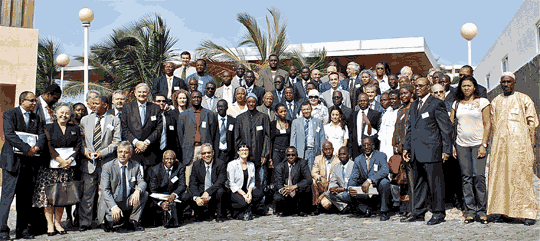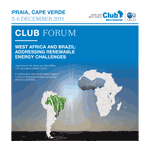SWAC Forum 2011


|
5-6 December 2011, Praia, Cape Verde Hosted by the government of Cape Verde, this year’s Forum was dedicated to renewable energy challenges within the context of South-South co-operation, in particular with Brazil. Discussions contributed to exchange country-level experiences and information on West Africa’s regional strategy for developping renewable energy sources. > download the Forum booklet | in Portuguese |
 |
|
About | Agenda | Conclusions | Participants | Presentations | Images |
Background
The development of renewable energy offers new opportunities for addressing West Africa’s various energy challenges. Efforts to gradually move away from the unsustainable use of biomass and fossil resources are already underway in certain countries. Cape Verde, for example, has set-up a very ambitious plan for developing renewable energy sources that aims to meet 50% of the country’s energy needs with renewable energy sources. Biofuels accounted for 26% of Brazil’s energy consumption in 2010 (compared to a world average of 2.3%). West Africa can learn from this experience as it seeks to develop its own regional renewable energy policies.
West Africa's Energy Challenges
The development of the energy sector is a key challenge for all West African countries, oil producing and oil importing alike, and the lack of access to reliable electricity sources heavily impedes the industralisation process. Nigeria is a particularly striking example. Despite being the region’s largest oil and gas exporter, about 60% of the population has no access to the electric power grid (90% in rural areas). Widespread and unsustainable use of wood resources also poses a serious threat to the region; it not only contributes to deforestation and desertification but may also ultimately impact food production and food security. For most countries in the region, over 60% of the total energy consumption comes from traditional biomass, and over 90% of the population uses wood and charcoal harvested from local forests for domestic cooking. In order to address these challenges, many West African countries have initiated power sector reforms geared towards the privatisation of state-owned, heavily bureaucratic electricity companies in the hopes of improving the efficiency of operations and increasing overall access. Countries are also seeking to attract new development partners in order to both benefit from their experience and acquire additional sources of Foreign Direct Investment. So far, only a few countries have established strategies for the development of renewable energy. However, many of West Africa’s key energy challenges (i.e. energy access, energy security and climate change mitigation and adaption) can more easily be addressed regionally.
The Sahel and West Africa Club’s Forum brings together SWAC Members and all stakeholders – public and private sectors, civil society representatives, development partners and the media – to discuss a priority development issue for Sahelian and West African countries. Pooling together their experiences, ideas and perspectives, it serves as a platform for participants from West Africa and other regions to identify potential areas for consensus-based regional action.
Drawing on key finding of the African Economic Outlook 2011, the first day of the Forum focused on West Africa’s relationship with “emerging partners”. More particularly Brazil and Cape Verde presented their respective visions. The second day addressed issues related to renewable energy, and analysed the complex linkages between bioenergy and food security.
Discussions focused on:
- Development co-operation prospects between West Africa and new partners, especially Brazil;
- Links and challenges related to bioenergy and food security objectives;
- Promotion of the regional strategy on renewable energy in West Africa and possible SWAC contributions.
Government representatives
- Ministries of Energy from Benin, Brazil, Burkina Faso, Cape Verde, Côte d’Ivoire, The Gambia, Ghana, Guinea, Guinea-Bissau, Liberia, Mali, Mauritania, Niger, Nigeria, Senegal, Sierra Leone and Togo;
- Ministries of Agriculture and Social Development from Burkina Faso and Brazil;
- Ministries of Foreign Affairs from Austria, Angola, Belgium, Brazil, Cape Verde, France, Switzerland
- National Agency for Development of Biofuels (ANADEB), Mali;
- Rural Electrification and Sustainable Supply of Domestic Fuel Programme (PERACOD), Senegal
- Parliament of Senegal
Regional Organisations
- Economic Community of West African States (ECOWAS)
- Permanent Interstate Committee for Drought Control in the Sahel (CILSS)
- West African Economic and Monetary Union (UEMOA)
Development Partners
- Brazilian Co-operation Agency (ABC)
- European Commission
- FAO/Global Bioenergy Partnership Secretariat
- Institut de l'Énergie et de l'Environnement de la Francophonie (IEPF)
- International Renewable Energy Agency (IRENA)
- UNHABITAT
- USAID
Banks
- African Biofuel and Renewable Energy Fund (BIDC/FABER)
- Brazilian Development Bank (BNDES)
- West African Bank of Development (WADB)
Private sector
- AGRITECH
- Belwet Biocarburant SA
- BioFuel Africa
- Cassava Agro industries Services Ltd
- ENACOL
- Global Biofuel Ltd
- Mali Biocarburants SA
- Sustainable Power Electric Company (SPEC)
Research Institutes
- Brazilian Agricultural Research Corporation (EMBRAPA)
- FGVProjects, Brazil
- Quinvita
- The Energy Center (TEC/KNUST)
- West Africa Institute for International Research on Regional Integration and Social Transformations (WAI)
NGOs and civil society representatives
- African Association for Biofuel Producers (AAPB)
- Environmental Development Action in the Third World (ENDA-Tiers Monde)
- Global Village Energy Partnership (GVEP-International)
- Network of Farmers' and Agricultural Producers' Organisations of West Africa (ROPPA)
- Regional Advisory Information and Network Systems (RAINS)
Press Release: > Press Release | in Portuguese | in French
Related Documents

